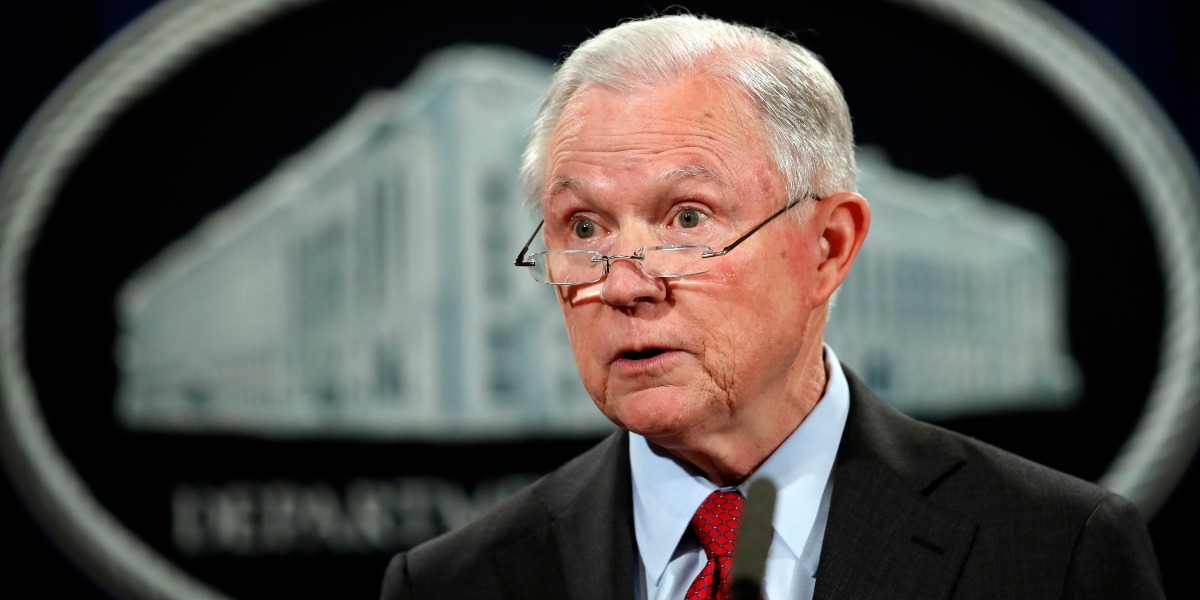The Justice Department, led by Attorney General Jeff Sessions, announced Thursday afternoon that it would be reversing an Obama-era policy that enabled several states to legalize marijuana.
Videos by Rare
While a senator, Sessions famously said that “good people don’t smoke marijuana,” apparently unaware that he was referring to more than half the U.S. population, and that “it’s not funny; it’s not something to laugh about,” apparently having never seen the movie “Pineapple Express.”
Recreational marijuana is currently legal in six states with two more set to legalize before the end of the year, a breakthrough made possible by the Cole memo in 2013, which ordered U.S. Attorneys in states that have legalized marijuana to deprioritize marijuana-related cases in those states. Unfortunately, all that progress could be quickly reversed now that Sessions has issued his own memo, announcing that the guidelines established by the Cole memo are “rescinded, effective immediately.”
The Associated Press broke the story, but their piece on Sessions’ new memo fails to clarify what will happen now. Colorado’s U.S. Attorney, Bob Troyer, said that his enforcement policy would not change, but others have suggested that recreational and even medical marijuana retailers in those states could be subject to arrest and that even the states themselves could be sued by the Justice Department for flouting federal law.
This new policy isn’t good for the states, who could lose a massive source of tax revenue. It isn’t good for the marijuana entrepreneurs who got in on the ground floor of a $6.7 billion industry that’s expected to grow to over $20 billion by 2020. It isn’t good for African-Americans, who despite using marijuana at slightly lower rates than whites, were arrested for possession four times more often. It isn’t good for communities being torn apart by the opioid crisis, since Colorado saw an immediate drop in opioid overdose deaths after the ballot measure legalizing recreational marijuana took effect in January 2014.
So, qui bono? Who benefits?
As far as I can tell, there are two main beneficiaries. First, Big Pharma. According to the American Society of Addiction Medicine, doctors wrote enough opioid painkiller prescriptions in 2012 for every American adult to have a full bottle of pills. The same report found that 80 percent of new heroin users started out by abusing prescription pain meds. The opioid market is big enough to rival the legal marijuana market, and with pharmaceutical companies making money hand over fist, I’m sure their lobbyists will be pleased to have a non-lethal competitor off the market.
Second, the drug cartels. In 2016, a Washington Post headline triumphantly proclaimed that legal marijuana was “finally doing what the drug war couldn’t.” Marijuana seizures at the Mexican border were at a 10-year low, reduced U.S. demand for pot had slashed the cartels’ profits, and there were even reports of American weed being smuggled into Mexico. If Sessions has his way, though, those cartels will soon be back to smuggling tons of marijuana into the U.S. and using their profits to finance their murderous activities.
Over the course of 40 years, the War on Drugs cost taxpayers over $1 trillion and ruined hundreds of thousands of lives. In 2015 alone, the opioid crisis cost $500 billion and killed 50,000 people, and those numbers have continued to rise.
In just a few short years, free market policies and increased liberty began to show us a way out of these national nightmares, but now all that could slip away with a few strokes of Jeff Sessions’ pen.



